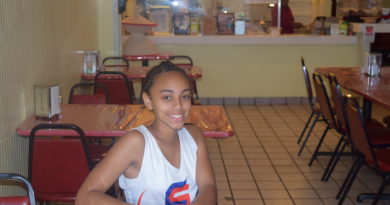Sparer Shares Her Story
For students in Athens, Georgia, it may be difficult to directly relate to an event such as Kristallnacht, also known as The Night of Broken Glass, a significant event leading up to the Holocaust.
The need to connect directly to such an important piece of history led 9th grade counselor Ms. Ariel Gordon and 9th grade English teacher Mrs. Katie Johnson to invite Holocaust survivor Dot Sparer, who lived in the heat of Kristallnacht, to visit Cedar Shoals and speak to a group of students about her childhood in Koenigsberg, Germany.
Strife for Sparer started at a young age. She was around four or five years old when Jews were not allowed to attend public school anymore. Sparer attended classes in the basement of a Jewish orphanage.
“Even in the early 30’s there was trouble (anti-Semitism),” said Sparer. “There were always little things.”
She was so young at the time that she didn’t have a clear idea of what was going on.
“You just figure that whatever it is, that that’s the way it’s supposed to be,” she said.
Even when the Nazi’s were beginnig to discriminate, young Sparer was able to identify the disruption.
“Before all this, Jews in Germany were very assembled, like they are. In Germany, people thought of themselves as German first, then Jewish second,” said Sparer.
Her father even fought in World War I for Germany before being persecuted.
“He was a medic. He got an iron cross for bravery in the war. Germany was his country,” said Sparer.
Later on, it was hard for Sparer to believe that an honored man fighting for his country could possibly be sent to a concentration camp just for being Jewish. Her family only left Germany three months before World War II broke out. She said her family was optimistic, figuring that Nazi dictator Adolf Hitler would fail.
“Before Kristallnacht, things were very normal, pretty much like it is here (in the United States),” said Sparer. The famed Kristallnacht is called the Night of Broken Glass because after the churches, synagogues, and businesses’ windows were smashed, the shattered glass looked like crystal on the ground because of the sheer amount of it.
Sparer also discussed another event that escalated the dangers of being Jewish in Nazi Germany. In the fall of 1938, an enraged 17 year-old Polish Jew who was living in France came to Germany and shot a German official because his parents were forced out out of Poland.
“That’s what Hitler used as an excuse: to burn synagogues, to kill people, to ransack homes, and to shut down businesses,” said Sparer.
One night, her father was taken away by Nazis in the middle of the night, and they forced him to clean up the wreckage in the streets. Being so young, Sparer didn’t have a clear picture of what was really going on.
“That’s also a way to add insult to injury. A lot of Jewish people in Koenigsberg were either professionals or at the University teaching. And the Nazis knew that. I think the worst was making them use the pages from Jewish books as toilet paper,” said Sparer.
Dot’s father was a profound doctor, and he had gone to school with a colleague who ended up working in Kansas City, Missouri. When Dr. Sparer asked for assistance to eschew the limit for 40,000 Jewish immigrants trying to get in the country, the family friend turned to a senator in Missouri who he knew personally to get the Sparer family into the United States. That senator was Harry Truman – the 33rd President of the United States.
His assistance allowed the Sparer family to leave Germany just three months before World War II technically began. After that time, Jews were sent to concentration camps en masse. The Sparers then moved in with family in Brooklyn, New York when she was in 3rd grade.
Reflecting on how these experiences shaped her everyday life, Sparer said, “I never really feel like I am at home. I feel like I’m an outsider in a very subtle way. I don’t think about it (Kristallnacht) everyday, and it doesn’t affect me very much, but I always feel different from people a little bit.”




